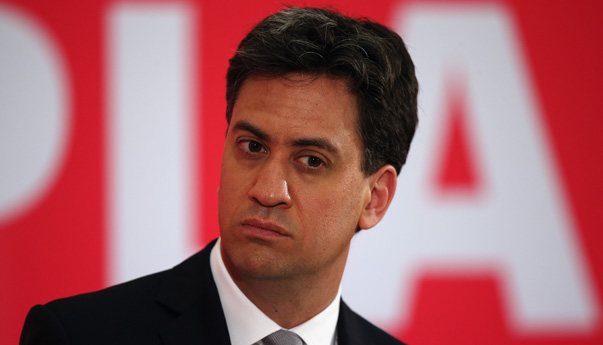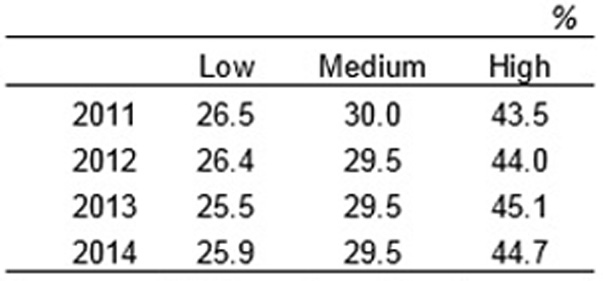We’ve been keeping an eye on statements made by all the major parties since the “long campaign” began just before Christmas.
The questionable factual claims, half-truths and outright fibs have come thick and fast.
But which party has proved to be the biggest FactCheck sinner in the run-up to this year’s election?
“We’ve halved the deficit”
The Tories’ “road to recovery” poster campaign hit the headlines for all the wrong reasons in January.
First, that road leading to the broad sunlit uplands turned out to be based on a photo from Germany.
Then there was the claim that the deficit had been halved on George Osborne’s watch. This was only half-true.
Office for Budget Responsibility figures at last month’s budget showed that the deficit had been reduced by 51 per cent as a share of national wealth at the end of 2014/15, but only by 41 per cent in cash terms.
And what the poster didn’t tell you is that Mr Osborne is set to miss the deficit reduction target he set out in 2010 by several years.
We looked at David Cameron’s broken promises here and also found that Mr Osborne has faced disappointing data on growth, living standards, consumer debt, productivity and exports.
The Lib Dems’ magic money
All the major parties have failed to set out exactly how they will cut the deficit.
The Conservatives, Lib Dems and Labour have all said they will be able to add billions more to the bottom line by closing tax avoidance loopholes.
But almost no detail has been forthcoming about how this will really be achieved.
The Institute for Fiscal Studies (IFS) has accused the parties of simply “making up numbers” on tax avoidance yields. If that is correct, the Lib Dems have made up the biggest number to try to get their spending plans to work – a whopping £10bn over the next parliament.
As we found, claims about how much the government has really clawed back from various tax avoidance policies are incredibly hard to stand up.
HMRC says it has raised staggering sums over the last parliament, but of lot of this is theoretical cash to be banked at some point in the future rather than real money in the coffers.
The Lib Dems are busy defending their record in government. We looked at some of their successes and failures here.
Labour’s jobs story
Shadow chancellor Ed Balls predicted that private sector employment would not cancel out the effect of public sector job cuts. He was completely wrong.
But Labour have an answer: more people might be in employment, but the quality of the job market has suffered.
Ed Miliband put it like this: “”Low pay. Low skills. Temporary jobs. Poor prospects. Zero hours contracts. This is the story of our economy for so many people in this country.”
But the official statistics do not back this up.
It’s true that temporary and part-time work and self-employment have gone up under the coalition – but so has full-time employment. As our graphic shows, the overall shape of the labour market has hardly changed at all between 2010 and 2015:
Low skills? ONS figures show there were proportionally more high-skilled and fewer low-skilled jobs in 2014 than in 2011:
Low pay? According to the Resolution Foundation, the proportion of workers it classes as low-paid has changed little since the coalition came to power, staying at around 20 per cent:
Labour get an extra black mark for continuing to claim that zero hours contracts have gone up under the coalition, despite being told off about this by the UK Statistics Authority.
The Office for National Statistics has clearly said that its zero hours figures are doubtful and should not be used as evidence that this kind of work is on the rise.
How else did Labour get it wrong on the economy? Find out here.
IFS vs SNP
The IFS has had sharp words for almost everyone in recent weeks, taking the biggest parties to task for not being straight with the public about the cuts and tax hikes they are planning.
One of the think-tank’s most damaging findings was that the SNP, despite claiming to offer an alternative to the austerity of the Tories and Labour, are planning cuts too.
The IFS said the nationalists would have to cut government borrowing on an almost identical scale to Labour and slash departmental budgets to achieve its spending plans.
The SNP took the unusual step of accusing the IFS of getting its numbers wrong.
Leader Nicola Sturgeon gets a late entry into this hall of shame for saying that the disruption of a Scottish Labour rally in Glasgow yesterday was “nothing to do with the SNP”.
It turns out that the two SNP members, James Scott and Piers Doughty-Brown, took part in the bad-tempered protest and have now been suspended by the party.
Ukip FactCheck themselves
It’s not often that an election manifesto contradicts things the party has been saying for some time.
Ukip have been saying for some time that we could save £2bn a year from “health tourism”, based on a misreading of Department of Health data.
Their manifesto downgrades this aspiration to a more realistic £500m to £900m a year.
Nigel Farage made much of the fact that only his party had got their sums checked by a respected independent think-tank. That was true.
But this was completely untrue:
The IFS just didn’t have time to look at Ukip’s manifesto.
The independent economic analysis was limited in scope and made no attempt to estimate the effects of two massive Ukip policies: pulling out of the EU and significantly reducing immigration.
Both of these things could have a massive effect on the UK economy but don’t figure in Ukip’s supposedly “fully costed” manifesto.
Mr Farage gets extra points for claiming unfair treatment by the BBC in an interview with the corporation’s flagship Radio 4 show Today.
“Can you imagine, if any of my councillors went to prison, the scale of media row?” he asked.
Peter Entwistle, 52, the former chairman of Ukip’s Bury branch, was jailed for possession of indecent images of children last year – and the BBC didn’t report it.
We FactChecked the Ukip manifesto here.












